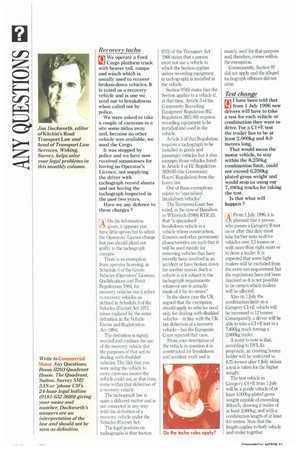Recovery tacho
Page 43

If you've noticed an error in this article please click here to report it so we can fix it.
We operate a Ford Cargo platform truck with beaver tail, ramps and winch which is usually used to recover broken-down vehicles. It is taxed as a recovery vehicle and is one we send out to breakdowns when called out by police.
We were asked to take a couple of caravans to a site some miles away and, because no other vehicle was available, we used the Cargo.
It was stopped by police and we have now received summonses for having no Operator's Licence, not supplying the driver with tachograph record sheets and not having the tachograph inspected in the past two years.
Have we any defence to these charges ?
A On the information VA given, it appears you have little option but to admit the Operators' Licence charge but you should plead not guilty to the tachograph charges.
There is an exemption from operator licensing, in Schedule 5 of the Goods Vehicles (Operators' Licences, Qualifications and Fees) Regulations 1984, for recovery vehicles but it refers to recovery vehicles as defined in Schedule 3 of the Vehicles (Excise) Act 1971 (since replaced by the same definition in the Vehicle Excise and Registration Act 1994).
The definition is tightly worded and confines the use of the recovery vehicle (for the purposes of that act to dealing with disabled vehicles. The fact that you were using the vehicle to carry caravans means the vehicle could not, at that time, come within that definition of a recovery vehicle.
The tachograph law is quite a different matter and is not connected in any way with the definition of a recovery vehicle under the Vehicles (Excise) Act.
The legal position on tachographs is that Section 97(1) of the Transport Act 1968 states that a person must not use a vehicle to which the Section applies unless recording equipment (a tachograph) is installed in the vehicle.
Section 97(6) states that the Section applies to a vehicle if, at that time, Article 3 of the Community Recording Equipment Regulation (EC Regulation 3821/85) requires recording equipment to be installed and used in the vehicle.
Article 3 of that Regulation requires a tachograph to be installed in goods and passenger vehicles but it also exempts those vehicles listed in Article 4 of EC Regulation 3820/85 (the Community Hours' Regulation) from the hours law One of these exemptions relates to "specialised breakdown vehicles".
The European Court has ruled, in the case of Hamilton vs Whitelock (1988) RTR 23, that "a specialised breakdown vehicle is a vehicle whose construction, fitments and other permanent characteristics are such that it will be used mainly for removing vehicles that have recently been involved in an accident or have broken down for another reason. Such a vehicle is not subject to the tachograph requirements whatever use is actually made of it by its owner."
In the above case the UK argued that the exemption should apply to vehicles used only for dealing with disabled vehicles —in line with the UK tax definition of a recovery vehicle—but the European Court rejected that view.
From your description of the vehicle in question it is constructed for breakdown and accident work and is mainly used for that purpose and, therefore, comes within the exemption.
Consequently, Section 97 did not apply and the alleged tachograph offences did not arise.












































































































